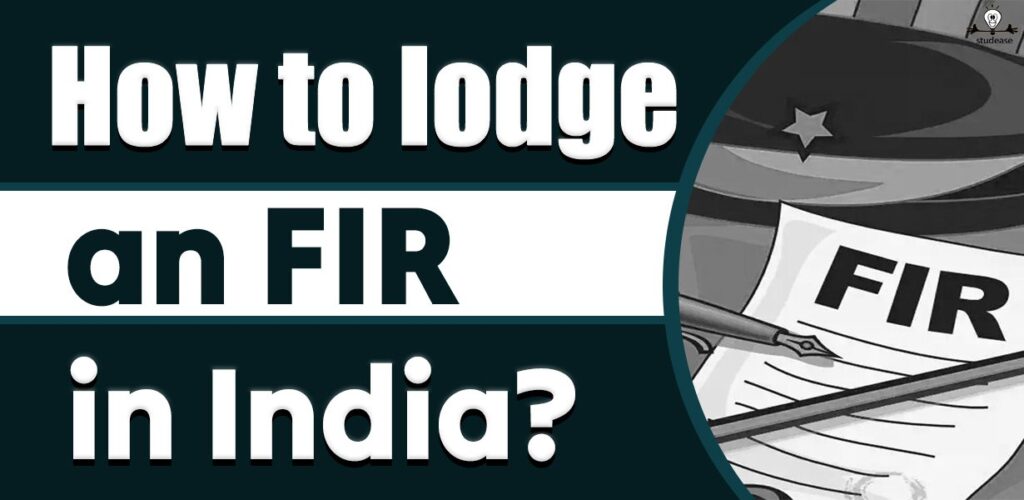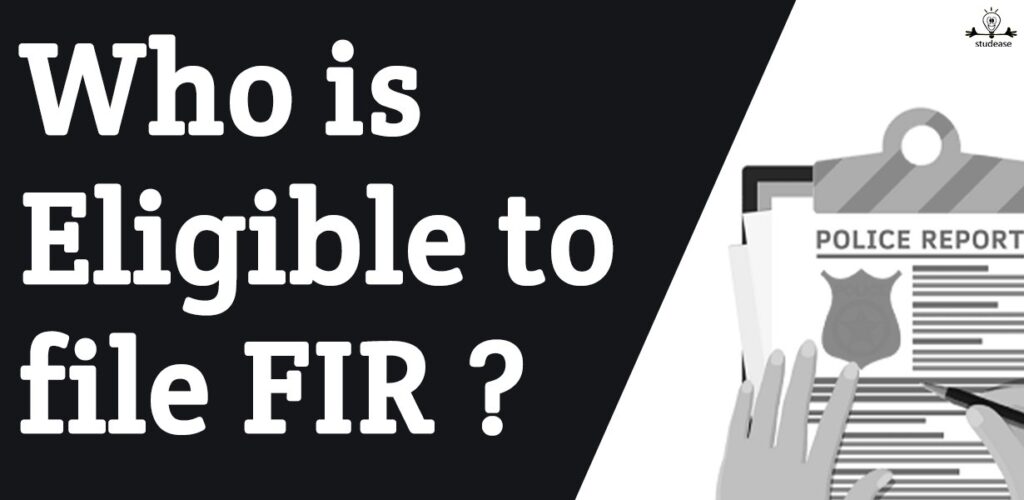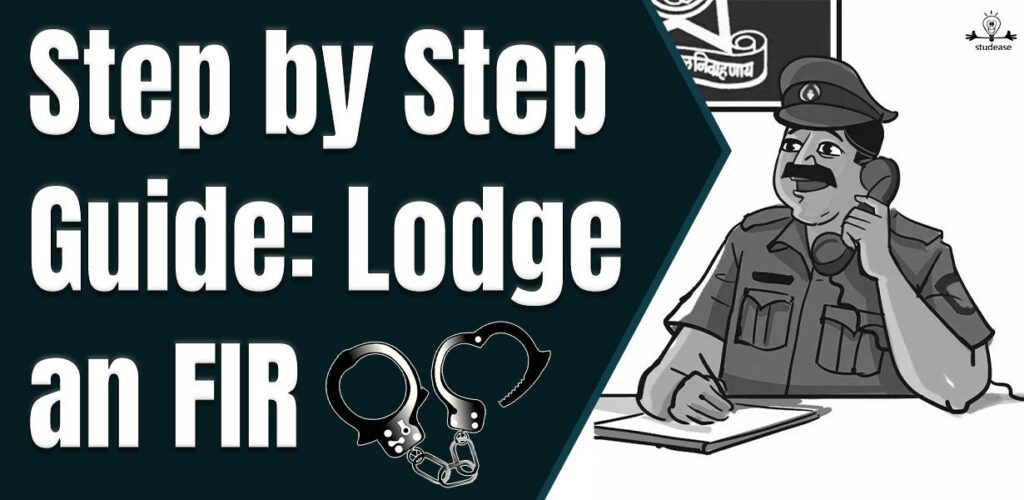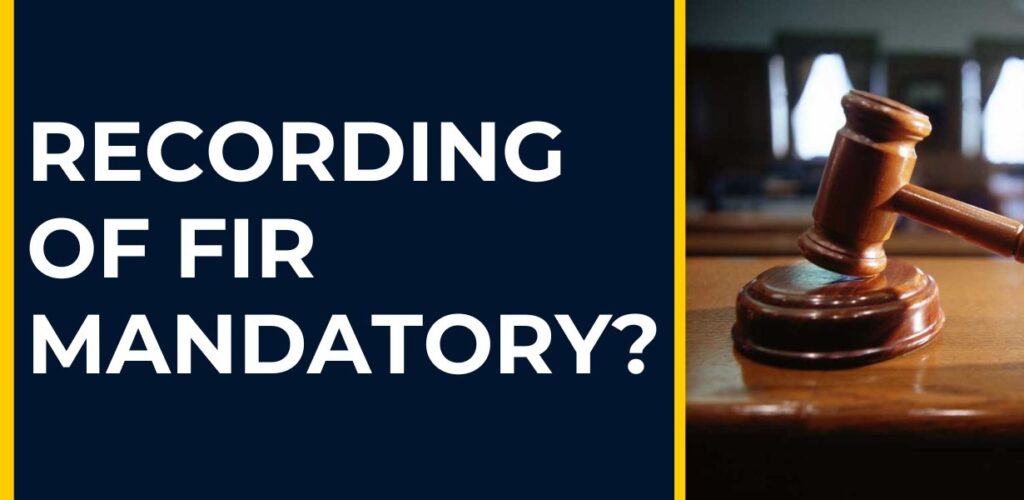How to Lodge an FIR in India: A Step by Step Guide

Lodging a First Information Report (FIR) is a crucial step in India’s legal process when it comes to reporting a cognizable offence. These offences typically involve crimes that demand immediate attention due to their severity. The importance of understanding how to lodge an FIR cannot be understated, as it is the first step towards seeking justice and initiating action from law enforcement authorities.
The procedure for filing an FIR in India is laid out in Section 154 of the Criminal Procedure Code 1973, which sets the guidelines on what information must be included in the report. It is essential for any individual with knowledge of a cognizable offence to promptly visit the nearest police station and relay the relevant details. This ensures that proper investigation is initiated, and the perpetrators are brought to justice.

In some cases, individuals may also have the option to file an FIR online. This process varies by jurisdiction but typically involves visiting the local police department’s website and following a series of guided steps. Regardless of the method chosen, timely and accurate reporting is crucial to ensuring the effectiveness of law enforcement in addressing criminal activity.
In this post, I will discuss regarding how to lodge an FIR in India and the procedure of Registering an FIR Online.
What is FIR (First Information Report)?
FIR, which stands for First Information Report, is a crucial document in India’s criminal justice system. It is prepared by the police when they receive information about the commission of a cognizable offence.
This document contains the pertinent facts of a case and serves as the basis for initiating an investigation. An FIR can be lodged by a victim or any individual on their behalf who has information about the occurrence of a cognizable offence.
Criminal Procedure Code
The Criminal Procedure Code (CrPC) governs the process of lodging an FIR. It stipulates that the police officer in charge has to register an FIR, irrespective of the gravity of the crime, as long as it involves a cognizable offence.
Section 154 CrPC deals with the provisions related to FIR.
Information in cognizable cases:
(1) Every information relating to the commission of a cognizable offence, if given orally to an officer in charge of a police station, shall be reduced to writing by him or under his direction, and be read Over to the informant; and every such information, whether given in writing or reduced to writing as aforesaid, shall be signed by the person giving it, and the substance thereof shall be entered in a book to be kept by such officer in such form as the State Government may prescribe in this behalf.
(2) A copy of the information as recorded under sub- section (1) shall be given forthwith, free of cost, to the informant.
(3) Any person aggrieved by a refusal on the part of an officer in charge of a police station to record the information referred to in subsection (1) may send the substance of such information, in writing and by post, to the Superintendent of Police concerned who, if satisfied that such information discloses the commission of a cognizable offence, shall either investigate the case himself or direct an investigation to be made by any police officer subordinate to him, in the manner provided by this Code, and such officer shall have all the powers of an officer in charge of the police station in relation to that offence.
Cognizable vs Non-Cognizable Offences
In India, offences are classified into two categories: Cognizable and Non-Cognizable Offences.
Cognizable Offences
Cognizable offenses are serious in nature and usually involve violations of fundamental laws or threats to public order. Examples include murder, rape, kidnapping, theft, and robbery. In these cases, the FIR is registered under Section 154 of the Criminal Procedure Code (CrPC) and the police have the authority to investigate and arrest without a warrant.
- These are serious crimes such as murder, rape or theft.
- The police can arrest a person without a warrant in these cases.
- Police are authorized to initiate investigation into cognizable offences without obtaining permission from the court.
Non-Cognizable Offences
Non-cognizable offenses are comparatively less serious crimes such as assault, criminal mischief, or defamation. For these cases, an FIR can be filed under Section 155 of the CrPC. However, the police cannot investigate or make an arrest without a warrant issued by a magistrate.
- These are less severe crimes, such as public nuisance, defamation, or trespassing.
- The police cannot make an arrest without obtaining a warrant from the court.
- Investigations into non-cognizable offences require prior permission from the court.
The FIR is an essential tool in the criminal justice system in India, and it is vital for reporting the commission of cognizable offences. The Criminal Procedure Code outlines the process for lodging an FIR, empowering both victims and police officers to report and initiate investigations. Understanding the differences between cognizable and non-cognizable offences is crucial in determining the appropriate course of action for the police and judicial system.
Who is eligible to file FIR?

In India, anyone with information about a cognizable offence can lodge a First Information Report (FIR). These individuals can include:
- The victim of the crime
- A witness to the crime
- A person with knowledge of the crime
- A police officer who comes to know about a cognizable offence
A cognizable offence refers to incidents for which the police can take action without prior court approval. Examples of these offences include, but are not limited to, murder, theft, and assault.
It is essential to note that the police officer in charge is obliged to file an FIR, no matter the gravity of the crime, as long as it is a cognizable offence.
It is important to note that while filing an FIR, the complainant should provide accurate and relevant information, including their name and address, the date, time, and location of the incident, and the facts related to the offense. This will help in ensuring a smooth and efficient investigation process.
Kinds of FIR
Zero Number FIR
A Zero FIR is lodged when a victim reports a crime to a police station that does not have jurisdiction over the case. The police station is still bound to register the FIR, but it will not be assigned a number until it is transferred to the appropriate police station having jurisdiction over the case.
Telephonic FIR
If a telephonic message clearly discloses the commission of a cognizable offense, it can be treated as an FIR. However, if the message is unclear or does not disclose the offense committed, it cannot be treated as an FIR.
An anonymous phone call relating to commission of an offence will not amount to FIR. (Kishan Singh v. State of Rajasthan 2003 CrLJ)
Multiple FIR
When several FIRs are lodged in respect of the same offense, they are known as multiple FIRs.
Cross FIR
A Cross FIR is a case where two or more parties lodge FIRs against each other.
When to Lodge an FIR
An FIR (First Information Report) should be lodged as soon as possible after a cognizable offence has taken place. A cognizable offence is one where a police officer can make an arrest without a warrant. To file an FIR, the complainant must visit the nearest police station, providing detailed information about the incident, such as the date, time, and place, along with any witnesses present.

Procedure for Filing an FIR Step-by-Step Process
- Place of filing: The FIR should be filed in the police station under whose jurisdiction the offense is committed (except in cases of urgent crimes).
- Visit the relevant police station: The person who has information about the crime, or the informant, should go to the nearest police station where the crime has been committed.
- Narrate the incident: After reaching the police station, the informant needs to narrate everything that he/she has seen or knows about the crime.
- Online submission: In some jurisdictions, such as Delhi, it is possible to file an FIR online through the official website of the local police (e.g., www.delhipolice.nic.in). Follow the instructions provided on the website to file the FIR/complaint.
Remember to maintain a professional tone of voice and avoid making exaggerated or false claims while providing the necessary information in the FIR. By following this checklist, you ensure that you have covered all the essential aspects of lodging an FIR in India.
The police officer is responsible for recording the FIR under Section 154 of the CrPC. The complainant should provide their name, address, and signature to ensure the FIR’s authenticity.
E-FIR: Registering an FIR Online
In some states of India, it is possible to lodge an E-FIR or register an FIR online. This process involves the following steps:
- Visit the official website of the concerned state police.
- Click on the ‘Services’ option and then on ‘Complaints’ to file an online complaint.
- Fill out the required details, including name, mobile number, email ID, and facts of the incident.
- Submit the complaint, which will serve as an E-FIR and initiate an investigation.
Delhi Police FIR Portal
For registering an FIR with Delhi Police, follow these steps:
- Visit the Delhi Police Official Website (www.delhipolice.nic.in).
- Click on ‘Services’ and then choose ‘Complaints’ from the online service box.
- Fill out the FIR/complaint form with the necessary information.
- Submit the FIR/complaint to initiate an investigation.
Other States in India
While the process of lodging an FIR varies across different states in India, the basic procedure remains similar. In case the police station refuses to register an FIR, the complainant can approach the Superintendent of Police, who has the authority to initiate an investigation or direct another police officer to do so. If the FIR is not filed, the complainant can also approach a Magistrate.
Is Recording of FIR Mandatory?

On receipt of an information of the commission of a cognizable offence, there is no option under the Code for the police officers but to register it in the general diary and proceed with the investigation.
An officer-in-charge of a police station must record the FIR as per the provisions of the Procedure Code and the inordinate delay in case of lodging the FIR, renders the prosecution case suspicious.
The view taken in the Case of State of Haryana vs. Bhajan Lal 1992, Ramesh Kumari vs. State (NCT of Delhi) (2006) and Parkash Singh Badal vs. State of Punjab (2007) that upon receipt of information by a police officer in-charge of a police station disclosing a cognizable offence, it is imperative for him to register a case under Section 154 of the Criminal Code, On the other hand, in other cases P. Sirajuddin vs. State of Madras (1970), Sevi vs. State of Tamil Nadu 1981, Shashikant vs. Central Bureau of Investigation (2007), and Rajinder Singh Katoch vs. Chandigarh Admn. (2007) it was submitted that an officer in-charge of a police station is not obliged under law, upon receipt of information disclosing commission of a cognizable offence, to register a case rather the discretion lies with him, in appropriate cases, to hold some sort of preliminary inquiry in relation to the veracity.
in Tapan Kumar Singh (supra), the Hon’ble Court has validated a preliminary inquiry prior to registering an FIR only on the ground that at the time the first information is received, the same does not disclose a cognizable offence.
The matter was finally submitted to a five Judge Bench in the case of Lalita Kumari vs. Govt. of U.P. & Ors. 2014 and the Conclusion/Directions issued in the case were:
(i) Registration of FIR is mandatory under Section 154 of the Code, if the information discloses commission of a cognizable offence and no preliminary inquiry is permissible in such a situation.
(ii) If the information received does not disclose a cognizable offence but indicates the necessity for an inquiry, a preliminary inquiry may be conducted only to ascertain whether cognizable offence is disclosed or not.
(iii) If the inquiry discloses the commission of a cognizable offence, the FIR must be registered. In cases where preliminary inquiry ends in closing the complaint, a copy of the entry of such closure must be supplied to the first informant forthwith and not later than one week. It must disclose reasons in brief for closing the complaint and not proceeding further.
(iv) The police officer cannot avoid his duty of registering offence if cognizable offence is disclosed. Action must be taken against erring officers who do not register the FIR if information received by him discloses a cognizable offence.
(v) The scope of preliminary inquiry is not to verify the veracity or otherwise of the information received but only to ascertain whether the information reveals any cognizable offence.
(vi) As to what type and in which cases preliminary inquiry is to be conducted will depend on the facts
and circumstances of each case. The category of cases in which preliminary inquiry may be made are as under:(a) Matrimonial disputes/ family disputes
(b) Commercial offences
(c) Medical negligence cases
(d) Corruption cases; the aforesaid are only illustrations and not exhaustive of all conditions which may warrant preliminary inquiry.(vii) While ensuring and protecting the rights of the accused and the complainant, a preliminary inquiry should be made time bound and in any case it should not exceed 7 days. The fact of such delay and the causes of it must be reflected in the General Diary entry.
(viii) Since the General Diary/Station Diary/Daily Diary is the record of all information received in a police station, we direct that all information relating to cognizable offences, whether resulting in registration of FIR or leading to an inquiry, must be mandatorily and meticulously reflected in the said Diary and the decision to conduct a preliminary inquiry must also be reflected, as mentioned above.
Contents of FIR in India
An FIR or First Information Report is a crucial document that acts as the preliminary record of any cognizable offence committed in India. It is important to know the contents that must be included in an FIR to ensure both the complainant and the police have accurate information. The following paragraphs detail the key elements that constitute an FIR.
The first aspect to be mentioned in an FIR is whether the informant is an eye witness or if the information is based on hearsay. This distinction proves vital in understanding the reliability of the information provided and helps the authorities determine their next course of action.
Information to be Included
The following pieces of information should be included in an FIR:
Whether the informant is an eyewitness or has hearsay evidence?
The nature of the cognizable offence.
The name and detailed description of the accused person (entire physical description).
The name and identity of the victim of the crime (if aware).
The date, time and place of the occurrence.
Another important detail to include in an FIR is the nature of the cognizable offence, which refers to the specific crime committed. Cognizable offences are those for which the police can take action without prior court approval (a warrant). Mentioning the type of crime assists the police in assessing the severity of the situation and prioritizing their resources accordingly.
The document should also mention the name and other details of the accused person, if known by the informant. If the name is not known, the informant should provide a detailed physical description of the accused individual, including any distinguishing features or characteristics.
The FIR must also feature the name and identity of the victim, if known by the informant. This information is essential in ensuring that the police can provide necessary assistance to the victim and that the investigation proceeds in the right direction.
It is also crucial to state the date and time of the occurrence of the crime. This piece of information can help the police ascertain the sequence of events and gather relevant evidence during the investigation process.
An FIR must include information related to the informant’s role, the cognizable offence, the accused and the victim, and the time and date of the crime. Providing these details accurately is of utmost importance for both the reporting individual and the police officers in addressing the situation effectively.
Value of an FIR
First Information Report or FIR serves as the initial step in investigating and documenting a cognizable offence. A cognizable offence is one where the police can take action without prior court approval, such as in cases of murder, robbery, and theft.
The importance of an FIR lies in its nature as the primary source of information about a crime. It contains the details about the alleged offence, including the time, date, place, and nature of the offence. An FIR helps the police establish the facts and circumstances surrounding a crime, as well as identify the accused, if possible. This information is crucial for the police in conducting an effective investigation and preventing further criminal activities.
Furthermore, lodging an FIR provides legal protection to the complainant, as it serves as evidence that they have informed the police about the alleged offence. This can be useful for the complainant later during the case proceedings.
In addition, the FIR serves as a record of the police’s actions in response to the alleged offence. The police are required to carry out the necessary inquiries and investigations once the FIR is registered. If the police fail to act on an FIR, the complainant can approach the higher authorities or the judiciary to ensure that their complaint is addressed.
The value of an FIR in India rests on its function as the first step in addressing a cognizable offence. It aids in the investigation, provides legal protection to the complainant, and holds the police accountable for their actions in handling the alleged crime.
Evidentiary Value of FIR

In case of Witness
In case of Victim
In case of Accused
If FIR was given by a Witness, in case of eye witness it can be used for corroboration and contradiction but in case of Hearsay Witness, then it has no value.
If FIR is given by the Victim, then FIR is not a substantive piece of Evidence but in exceptional cases, FIR can be treated as substantive piece of evidence. If the victim survives, it can be used to
(i) Corroborate (ii) To Contradict (iii) As Res Gestae (iv) As subsequent conduct under Section 8 IEA.
If the FIR was lodged by the Accused, if it is confessional in nature, then it is hit by Section 25 of Evidence Act, which means such a Confessional FIR will have no value. But Section 27 of Evidence Act is an exception to Section 25 of Evidence Act.
Role of Police and Complainant
Police Investigation
The role of police in the lodging of an FIR (First Information Report) primarily involves the investigation, collection of evidence, and apprehension of the accused.
When an individual reports a cognizable offence, the police officer in charge has the responsibility to file an FIR. This duty remains irrespective of the gravity of the crime, as long as it is a cognizable offence.
After lodging an FIR, the police initiate the process of investigation. During the investigation, the police gathers evidence and question the witnesses. The police officer in charge may arrest the accused, with or without a warrant, depending on the circumstances and the gravity of the offence.
Rights and Duties of Complainant
The complainant, who can be the victim or anyone on their behalf, has the right to lodge an FIR with the police. It is crucial to file the FIR without any unreasonable delay to avoid consequences that may arise from delayed reporting. The complainant must provide accurate information about the incident, including the place, time, description of the offence, and any possible suspects.
The complainant has the right to:
- Be informed of the progress of the investigation
- Be provided with a copy of the FIR
- Seek protection from the police if they experience any threats, intimidation, or harassment
- Be heard in court during legal proceedings
The duties of the complainant include:
- Providing truthful, complete, and accurate information to the police during the investigation
- Cooperating with the police by providing the required documents and evidence
- Appearing in court as a witness if summoned
To sum up, both the police and the complainant play essential roles in the lodging and investigation of an FIR in India. The police are responsible for conducting a thorough investigation, collecting evidence, and apprehending the accused. The complainant, on the other hand, must provide accurate information and cooperate with the investigation process. Both parties should work together to ensure that justice is served for the victim and society.
Conclusion
Lodging an FIR (First Information Report) in India is a crucial step for any individual who has information about a cognizable offence. It acts as the first step in initiating the legal process and ensures that the police can investigate and potentially take action against the offender.
To file an FIR, one can either visit the nearest police station in person or, in some cases, file it online through the official website of the respective state’s police department as discussed earlier.
When providing information orally, the police officer in charge must write it down, read it back to the informant, and take their signature. The police cannot reject an FIR and have an obligation to file a report for any cognizable offence brought to their attention.
It is important to file an FIR without any unreasonable delays, as this can have consequences on the outcome of the case. If the police officer refuses to file an FIR, one can approach higher authorities, such as the Superintendent of Police (SP) or the Commissioner of Police (CP), depending on the jurisdiction.
Thus, lodging an FIR in India is a vital step in addressing cognizable offences and initiating legal action. Understanding the process and the rights entitled to informants can help ensure that the legal system works efficiently and that justice is served.
What Next?
We at studease encourage students to prepare well and stay informed. For more Content, Join our Telegram group to stay updated.
Join: studease Telegram Channel
Follow us: instagram
Subscribe: studease Youtube Channel
Download studease App:

Frequently Asked Questions
Q1 Is accused entitled to the copy of FIR?
Yes, accused is entitled to copy of FIR at the time of arrest and even before chargesheet is filed.
Q2 Dows omission to record the substance of FIR in the daily diary affects the validity of the report?
No, Mere omission to record the substance of FIR in the daily diary does not affect the validity of the report if other formalities are observed. (Balwant Singh v. Punjab 1978)
Q3 Is second FIR on same facts is permissible?
No, this is the direct answer to the given statement that second FIR on same facts is not permissible. However, if the second version is different or the transaction/offence is different.
Q4 Is there any effect if there is a delay in lodging FIR?
The delay in lodging the FIR will effect the credibility of the information but if the delay is properly explained then it will not effect the case. (Gurmeet Singh v. State of Punjab 1996 SC)






